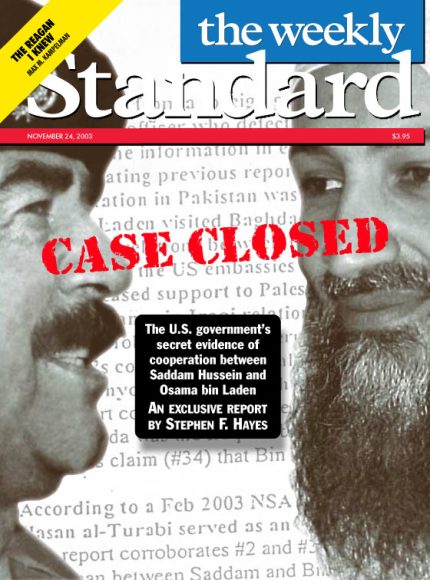What The Weekly Standard Has Wrought
Its shuttering is a loss. But the awful costs of the foreign policy it advocated shouldn’t be forgotten.
By SCOTT MCCONNELL • December 17, 2018
There’s a sadness in the shuttering of any print publication, and The Weekly Standard is no exception. If its website is dismantled as the owners have suggested is likely, it will be a loss to the reading public and even to the world’s ability to understand itself. Any right-of-center reader would have found much to admire in the Standard, both in its early days and now. Christopher Caldwell, who has written for the magazine since its inception, has developed into America’s most important analyst of contemporary Europe. Andrew Ferguson always writes with wit and style. Several Heather Mac Donald essays have fiercely told the truth on the delicate subjects of race, policing, and political correctness on campus. …
Invariably left unsaid or minimized in such accounts (the Times devoted a full eight words to the subject) is the role the Standard played in fomenting the Iraq war, the sole policy question where the magazine’s role was unambiguous and decisive. Given the centrality of foreign policy to Kristol’s concerns, it is probably not too much to say that for the Standard, the main purpose of publishing the writers referenced above was to provide an attractive gift wrapping for neoconservative foreign policy advocacy.
It was far from obvious how the United States would respond after the terror attacks of 9/11. Pretty much everyone but pacifists agreed there would be a military campaign against the Taliban, which had provided a base for Osama bin Laden in Afghanistan, and a campaign to destroy al-Qaeda, which had been conducting major terrorism operations in Africa and the Mideast. But Iraq was not on the radar for most. There were no serious connections between Saddam Hussein’s essentially secular dictatorship and a group bent on restoring a caliphate based on fundamentalist Islam. …
9/11 provided an opportunity to change that. As a glossy weekly publication, with hundreds of issues hand-delivered every week to important Beltway figures, the Standard occupied a critical node in Beltway opinion formation. Neoconservative think tank types could publish a piece there, and then go on Fox News (another Rupert Murdoch property) to reach non-magazine readers. And unlike most in the American government, Kristol knew exactly what he wanted America to do after 9/11: overthrow Saddam Hussein. …
Diverting the nation’s anger from bin Laden and towards Saddam Hussein was the priority. Wrote Schmitt and Donnelly, the “larger campaign must also go after Saddam Hussein. He might well be implicated in this weeks’s attacks or he might not. But…he is our enemy. Elimination of Saddam is the key to restoring our regional dominance.”
The magazine pounded this message relentlessly for months. Saddam was paired at the hip with Osama bin Laden in virtually every issue. “Who cares if Saddam Hussein was involved in the 9/11 attacks?” asked Max Boot. He, for one, did not, as he urged the American government to establish a regency on Baghdad to go with the one on Kabul. Reuel Mark Gerecht echoed PNAC, arguing that the war on terror would be a failure unless we removed Saddam. Stephen Hayes (later to become editor of the magazine) funneled intelligence scraps generated by a neoconservative nest in the Pentagon led by Douglas Feith to claim a relationship between Saddam and bin Laden that the CIA did not believe to be credible.
… the editors’ sheer skill at normalizing the idea that attacking a dictator with no connection to al-Qaeda was the only non-defeatist option. Seen in these terms, the Standard was a monumental success. It achieved its aims on a discrete policy issue more emphatically than any publication in living memory.















